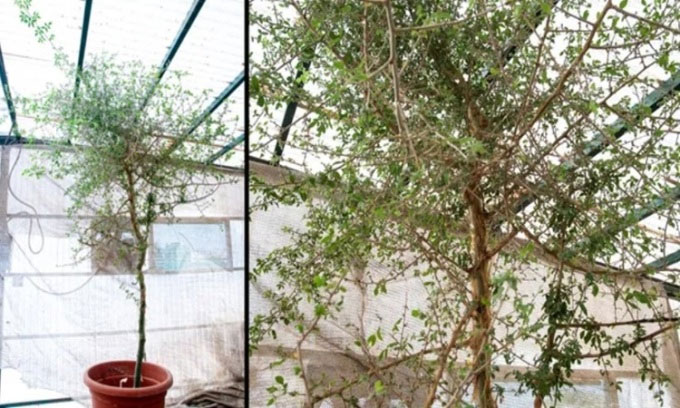Ancient plant species revived from 1,000-year-old seeds
Scientists have successfully grown a mysterious 1,000-year-old seed discovered in the Judean desert and obtained a specimen of a plant mentioned in the Bible.
It took the team nearly 14 years to grow the plant from an ancient seed unearthed in a cave in the late 1980s. Nicknamed "Sheba," the specimen now stands about 10 feet tall, meaning researchers can finally describe its adult features. They were also able to conduct DNA, chemical, and radiocarbon analyses that revealed new clues about its origins, according to the study published in the journal Communications Biology, Live Science reported on Sept. 23.

The team planted ancient seeds in 2010. (Photo: Sarah Sallon).
The seed that grew into the Sheba tree dates to around 993–1202 , according to the study. It is likely a remnant of a now-extinct population of the tree that lived in the Southern Levant, an area that includes Israel, Palestine, and Jordan. The adult specimen may have been the source of a medicinal oil called 'tsori,' extracted from the tree's resin and used in the Bible for its healing properties. The compound is associated with the region of Gilead, which lies east of the Jordan River between the Yarmuk River and the northern end of the Dead Sea. By reviving Sheba, the team believes they may finally be able to unravel the mystery of tsori.
The researchers determined that Sheba belongs to the genus Myrrh, within the family Myrrhaceae, which includes about 200 living species. Myrrh trees are found mainly in Africa, Madagascar, and the Arabian Peninsula. The team led by Sarah Sallon of the Natural Medicine Research Center in Israel is unclear as the Sheba tree has not yet flowered, and therefore has not produced the reproductive material that scientists need for more detailed analysis.
However, Sheba is certainly closely related to three Myrrh species, C. angolensis, C. neglecta, and C. tenuipetiolata, which grow in southern Africa. The team's analysis found that Sheba has no aromatic compounds but does have a range of medicinal properties. This, along with other characteristics such as the location of the seeds in the northern Judean Desert, suggests that it may be the source of the biblical tsori balm.
Chemical analysis of the leaves and sap of the Sheba plant revealed that the plant is rich in pentacyclic triterpenoids , bioactive compounds with anti-inflammatory and anti-cancer properties. The leaves and roots also contain high levels of squalene, a natural oil that acts as an antioxidant and smooths the skin. The team will need to investigate further to identify other compounds with anti-cancer potential in the plant tissue.
- Revive the frozen tree 30,000 years
- Stunned for 800 years pumpkin seeds can still sprout
- Detecting exotic seeds located 2,000 years in the tomb
- How to choose melon seeds is not stained with chemicals
- The ancient Siberian creature revived, operating after 42,000 years of freezing
- Discovered flower seeds hibernating from 110 million years ago
- Discover self-seeding plants in Brazil
- Successfully propagating an endangered plant species
- New species named after the President of the Academy of Science and Technology
- Every year, tens of thousands of animal and plant species are extinct
- Decoding the terrible toxicity of the 'suicide tree': The tree grows wild on the coast
- Discovered new species of Cuc family that are able to hold water
 Why do potatoes have eyes?
Why do potatoes have eyes? 'Tragedy' the world's largest carnivorous life: Death becomes ... public toilet
'Tragedy' the world's largest carnivorous life: Death becomes ... public toilet Tomatoes were once considered 'poisonous' for 200 years
Tomatoes were once considered 'poisonous' for 200 years Detecting microscopic parasites on human face
Detecting microscopic parasites on human face